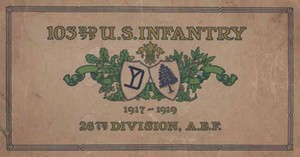
of the 26th Division of the U.S. Army
during World War I
 | The History of the 103rd Regiment of the 26th Division of the U.S. Army during World War I |
| Table of Contents | ||
| T0 the north lay Mount Tom and to the north and west the foothills of the Berk- shires. It was an ideal spot. For the 103rd there was ample drill and parade ground which had been policed and cleared of brush hy the first units arriving. Each night at retreat the battalions in rotation held evening parade. This was usually well attended by friends and relatives of the mcn in camp. Except during prescribed hours the camp was closed to visitors. Discipline was excellent. Football and baseball during spare hours helped to raise morale in the companies and regiment and build up the proper esprit-de-corps. As the different units arrived and were settled, intensive training was at once taken up, and a good foundation layed for the further training which was to follow in France. Ideal fall days with cool, clear nights made for good health and good work, On September 24 the first elements of the regiment started the move for "some- where over there." Every effort was made to prevent the spreading of informa- tion as to when and where the division was to embark; this was a necessary pre- cautionary measure for the menace of submarines was an actual one. To a large degree the policy of secrecy was successful. To quote again from the 7`mnscript: " It is now permitted to record the arrival in France of the New England Division of the National Guard which, without a word of press chronicle except a furtive and almost unconscious betrayal of one regiment’s departure from Framingham, sailed from American ports in September and in early October, and which before the end of October had all safely arrived in France. "It was in reality a strange episode in our history, that this little army repre- senting the cream of young New England manhood, the equal and equivalent of that brave band who departed from our cluster of oldest States in 186], with sound of trumpets and proud oxultations then, should have gone forth now with— out a word, without the beat of a drum, while at the same moment we were paying endless attention to the small details of the organization in the draft camps of that slower army, which will not depart on the same road for months to come, ln the camps of concentration, the little groups of relatives of the young soldiers assembled upon private notice and marched with them in silence to the station, standing while the trains rolled forth in darkness on an unknown way. The moment was epic, and will live in our history. But then the great world knew it not at all." Such was the outsider’s point of view of tho departure. The men in the ranks knew even less as to the where and how; whether the trains that left from the siding out there at ezunp were headed for Boston, Portland, Montreal, or New York, they did not know. Regimental Headquarters, Headquarters Company, and the lst Battalion left \’VestEield on September 25, and on arriving at Ha.rlem Station were imme- diately ferried to thc pier where they boarded the Celtic. The 2nd Battalion boarded the Saxonia and the 3rd Battalion the Lapland. The ships did not leave New York at the same time. The convoy was to assemble, as events later proved, at Halifax. The t1·ip out of New York and up the coast to Halifax where the convoy as- sembled September 29 was uneventful. Possibly the men were really a little serious, realized that they were on their way "ovcr there." Consciousness of this must have loomed large when that first hospital ship with its huge red cross painted on sides and smoke stacks was seen in Halifax harbor. It was wonderful to see that column of vessels, nine or ten, file out from Halifax just before sun· down; it was still better to be "of them." The band on board the Celtic struck up "Hound Dog," and cheers went up not only from our vessels but from others in the harbor. The Lapland lay over until ll P, M. to coal; to the men on board her it was particularly given to review and witness the spectacle of that file of vessels going east into the dark, bearing some of the United States "first hundred- thousand," yes, first fifty thousand; they ought never to forget, and probably never will, the significance of that hour. A call had eome from the fields of France, had been heard, and was being answered. | ||
| Original Version of Page |